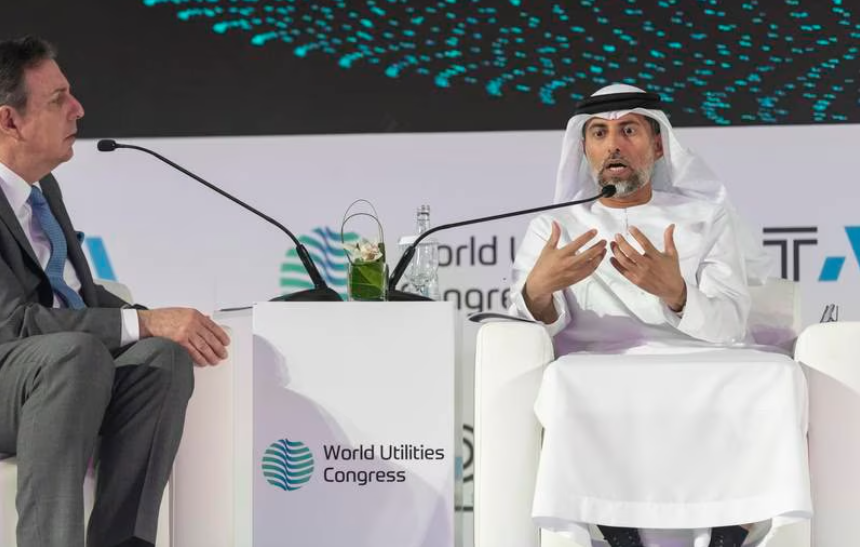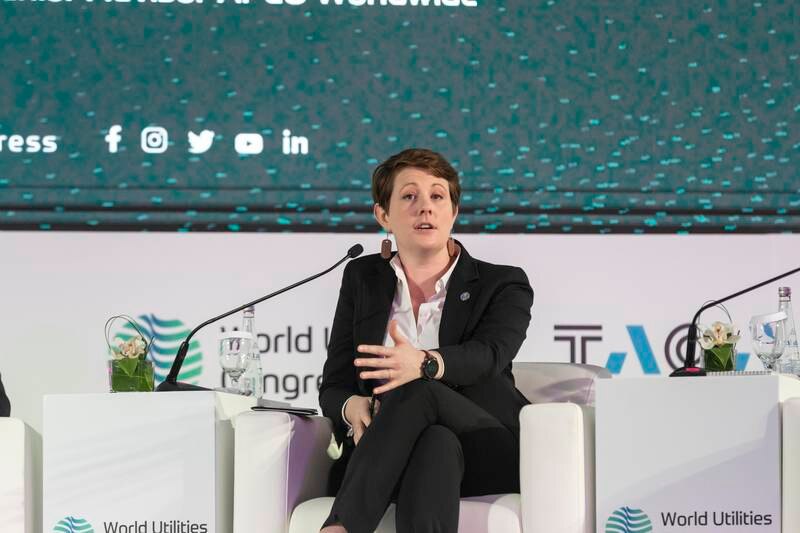There should be 'mega investments' in the interconnection of the grid for the 'full utilisation' of power, UAE energy minister says
Suhail Al Mazrouei, UAE Minister of Energy and Infrastructure, speaking at the World Utilities Congress on Monday. Antonie Robertson / The National
Bahrain, the Arabian Gulf’s smallest oil producer, aims to double renewable energy targets to achieve 20 per cent of the total energy mix by 2035, its Minister of Electricity and Water Affairs has said.
“We targeting net zero by 2060, 30 per cent reduction in greenhouse gas emissions by 2035 … doubling renewable energy targets to achieve 20 per cent of the energy mix by 2035 and doubling the afforestation areas in Bahrain,” Yaser bin Ebrahim Humaidan told the World Utility Congress on Monday.
Bahrain is among the GCC countries seeking to boost renewable energy production to reduce emissions and become net zero in the coming decades.
The UAE is investing Dh600 billion ($163.5 billion) in clean and renewable energy projects over the next three decades as it aims to achieve net zero emissions by 2050. The country is building the world’s largest solar plant in the Al Dhafra region of Abu Dhabi with a capacity of 2 gigawatts, as well as the Mohammed bin Rashid Solar Park in Dubai with a 5 gigawatt capacity.
Saudi Arabia, the Arab world’s largest economy, aims to achieve net zero by 2060 and is developing a number of new renewable energy projects.
Bahrain is making “progress” in a number of areas as it aims to achieve the net-zero target by 2060, Mr Humaidan said.
Kathryn Huff, of the US Department of Energy, said nuclear power helped generate about 20 per cent of US electricity. Antonie Robertson / The National
“We have engaged with several of the large industrial emitters and we have implemented a system of continuous emissions monitoring where we can monitor their emissions remotely, continuously and in real-time,” he said. "And that also enables us to have the ability to immediately detect any violations and take corrective action."
Mr Humaidan underscored the collaboration between the private and public sector to achieve net-zero targets and said “both need to work together to build their efforts and amplify them together”.
Suhail Al Mazrouei, UAE Minister of Energy and Infrastructure, said there should be “mega investments” in the interconnection of the grid for the “full utilisation” of power, as the Gulf countries step up investment in boosting renewable energy capacity.
“There is an idle capacity that is not utilised and interconnecting within the Middle East and within the Arab world, and hopefully, North to Central Asia one day is going to enable us to be more efficient ... and enable us also to do more projects as some [countries] have access to wind, others have to access to solar and others have access to hydro,” he said during a panel discussion at the event.
"There is no transition without interconnectivity with your neighbours and working together as a cluster, clusters of countries and a cluster of interlinking as a continent."
Nuclear energy is critical to US infrastructure and is going to be an essential part of the climate transition in the world's largest economy, according to Kathryn Huff, assistant secretary at the Office of Nuclear Energy at the US Department of Energy.
"Nuclear power is about 20 per cent of our electricity and it's about half of our clean power," Ms Huff said of the US.
"In order to get to the transition that we need to get to net zero by 2050, it's going to be important that we replace unabated retiring and retired coal plants ... this may require building out another 100 gigawatts or 200 new gigawatts of nuclear power in the United States."

